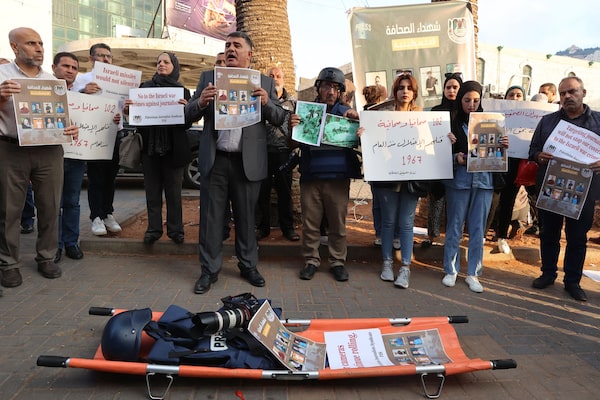
Palestinian journalists attend a gathering to denounce the killing of journalists on Oct. 10, in Nablus, in the occupied West Bank.ZAIN JAAFAR/AFP/Getty Images
At least 27 journalists have been killed in 20 days of warfare between Israel and Hamas, making it one of the deadliest conflicts for the profession in recent times.
The Committee to Protect Journalists, a New York-based non-profit organization that promotes press freedom globally, issued its most recent tally of journalist casualties on Thursday. Included in the death toll are 22 Palestinians, four Israelis and one Lebanese.
“This is unprecedented even for past Gaza wars,” said Sherif Mansour, CPJ’s Middle East and North Africa program co-ordinator.
“In many ways, the people taking the highest toll are local Palestinian journalists who have no exit,” he added. “They are on the front lines.”
Another eight journalists are listed as injured. Nine are believed to be missing or detained.
Those figures are expected to surge in the coming days. The CPJ is investigating countless other reports of journalists being killed, injured, detained or harassed.
“We’re investigating new cases every day,” Mr. Mansour said.
Ten of the deaths happened in the opening two days of the war, when Hamas launched a deadly attack on Israeli towns and Israel responded with relentless air strikes.
Mr. Mansour said dozens of media outlets clustered in high towers were bombed early on. The organization estimates that 48 media facilities have been damaged or destroyed.
UNESCO director-general Audrey Azoulay called the first seven days of combat “the deadliest week for journalists in any recent conflict.”
“This is a dramatic toll,” she said in a statement. “Never in recent conflict has the profession had to pay such a heavy price in such a short space of time. I call on regional and international actors to take immediate action to ensure that international law is respected.”
The CPJ relies on double confirmations to verify a journalist’s death, generally with a media outlet and the victim’s family. Conditions in Gaza, where electricity, internet service and phone coverage are spotty, have made those verifications difficult, Mr. Mansour said.
Beyond those figures are countless journalists whose families have been casualties of the hostilities. On Wednesday, Wael Al-Dahdouh, Gaza bureau chief for Al Jazeera’s Arabic-language service, was broadcasting live when he received news that his wife, son, daughter and infant grandson had been killed in central Gaza, according to social-media posts by an Al Jazeera editor, Mohamed Moawad.
The Qatari-owned news channel later aired video of a distraught Mr. Al-Dahdouh walking through a hospital wearing his familiar navy blue press vest before cradling the body of his seven-year-old daughter Sham and embracing the body of his 15-year-old son Mahmoud.
The channel’s parent company, Al Jazeera Media Network, issued a statement blaming an “indiscriminate assault” by Israel on the Nuseirat refugee camp, in the centre of Gaza.
The family had been sheltering there since evacuating their home in Gaza City, in accordance with Israel’s call for all civilians to move south ahead of a possible ground invasion.
“Al Jazeera is deeply concerned about the safety, and well-being of our colleagues in Gaza and hold the Israeli authorities responsible for their security,” the statement reads. “The network strongly condemns the indiscriminate targeting and killing of innocent civilians in Gaza, which has led to the loss of Wael Al-Dahdouh’s family and countless others.”
In response, the Israel Defence Forces said that it was targeting “Hamas terrorist infrastructure in the area.”
“Strikes on military targets are subject to relevant provisions of international law, including the taking of feasible precautions to mitigate civilian casualties,” it said in a statement.
In total CPJ has identified 2,018 journalist deaths since 1992. Iraq has been the most dangerous conflict zone for journalists in recent times, with 189 deaths since the 2003 U.S. invasion. The next deadliest country is Syria, with 140 journalists killed during the country’s prolonged civil war.
 Patrick White
Patrick White